- Home
- Stephen L Carter
Emperor of Ocean Park eh-1 Page 4
Emperor of Ocean Park eh-1 Read online
Page 4
I keep leafing through the albums. A third is full of graduation pictures-mine, Mariah’s, Addison’s, from all levels of our education-along with shots of Mariah and Addison receiving various awards. Especially Addison. None of me, but I have never won anything. Forcing a smile, I keep flipping pages. Most of the book is empty. Space for shots of the grandchildren, perhaps. I put the album away. The next one has the most attractive binder, soft old leather stained a dark blue, and is full of newspaper clippings, all of which seem to be about-
Oh, no.
I close the book quickly and close my eyes slowly and see my father rushing out of the house late on a spring evening, commanding my mother to stay put, Claire, just stay put, we have three other children to worry about, I’ll call you from the hospital! And, later still, my mother answering the phone on the kitchen wall, her hand trembling, then moaning in maternal horror and sagging against the counter, before turning businesslike and distant, which both my parents could do at a snap. I was the lone witness to this display. Mariah and Addison were away at college and Abby was out somewhere; at fifteen, Abby seemed always to be out somewhere, quarreling constantly with our parents. My mother made me dress and hurried me over to a neighbor’s house, even though, at close to seventeen years of age, I was more than capable of staying home unguarded. She left me with quick, desperate kisses, vanishing in the other car on unexplained but obviously tragic business. It was after midnight when my father came to pick me up and sat me down in the living room at Shepard Street and told me in a quivering voice, quite far from his usual radio-announcer tone, that Abby was dead.
From the day of her funeral until the day he died, my father hardly mentioned Abby’s name.
But he kept a scrapbook. A decidedly weird scrapbook I open my eyes once more and leaf through the pages.
And notice at once that something is wrong.
Only the first four clippings have anything to do with Abby. The news story of her death. The formal obituary. A follow-up a week later informing readers that the police had no leads. Another article two months further on reporting the same joyless tidings.
My father was angry in those days, I remember. He was angry all the time. And he began to drink. Alone, the way prominent alcoholics do, locked in this very room. Perhaps poring over this very scrapbook.
I turn the page. The next clipping, dated a few months later, records the death of a small child in a hit-and-run accident in Maryland. I shudder. The following page carries another clipping: a young seminary student, also a hit-and-run victim. I turn and turn. The contents chill me. Page after page of newspaper stories about innocent people killed by hit-and-run drivers, all over the United States. Two, almost three years of them. An elderly woman leaving a supermarket in a small town. A police officer directing traffic in a big city. A rich, politically connected college student, her convertible crushed by a tractor-trailer. A news reporter smashed by a station wagon while changing a flat on a busy highway. A high-school football coach, mangled by a taxi. An impoverished mother of six, a famous writer, a bank clerk, a heart surgeon, a wanted burglar, a teenager on her way to a babysitting job, the son of a prominent politician, a potpourri of American tragedy. Some of the stories bear the inky stamps of the various clipping services that used to send you articles from around the country on a subject of your choice, back before online research; many are no more than tiny one-paragraph items from the Post and the old Star; and a few, very few, are marked with faded blue asterisks and, scribbled in the margins, dates, usually much later than the publication dates of the stories themselves. By working backward from other stories in the album, I soon figure out that the asterisks mark the hit-and-runs in which the driver who did the hitting and running was eventually caught. And a few of the articles about arrests are further annotated with brief, angry notes in my father’s crabbed handwriting: I hope they fry the bastard, or You’d better have a good lawyer, my friend, or At least somebody’s parents got justice.
I flip quickly to the back of the book. The collection ends in the very late seventies, about the time the Judge’s drinking stopped. Makes sense. But nothing else does.
This is not the nostalgic scrapbook of a parent who misses a child; this is the product of a mind obsessed. It strikes me as diabolical in the traditional Christian sense, a thing of the devil. The air around the book seems thick with an aura of mental corruption, as though haunted by the spirit of the madman who assembled it… or the spirit that possessed him to do so. I quickly slide the binder back into its place, fearing that somehow it might infect me with its gleeful lunacy. Odd that it should be sitting here this way, mixed in with the happier memories. Insanity of this sort, even if temporary, is precisely what few children want to know about their parents… and what few parents want their children to know about. The Garlands have many little secrets, and this is among them: when Abby died, my father went a little nuts, and then he got better.
I close my eyes again and sink into the chair. He got better. That is the important thing. He got better. The man we are burying next week is not the man who sat here in this ugly little room, drinking himself insensible night after night, flipping through the pages of this sick scrapbook, terrorizing the family not with anger or violence but with the awful silence of emotional destitution.
He got better.
And yet my fanatically private father preserved this album, the record of his short-lived insanity, where any visitor to the house might blunder across it. I can readily believe that the Judge would have created the scrapbook during his madness, but it seems reckless, out of character, to have held on to it in the years since. All other evidence was discarded years ago. There are, for example, no liquor bottles in the house. The book, however, survives, right on the shelf. Fortunately for my father’s reputation, nobody happened upon the book at the time that the Senate Judiciary Committee was holding its hearings on his-
The door to the little room snaps open. Sally is standing there in her unreasonably tight gray dress, her substantial chest heaving, a rapturous yet somehow helpless smile shining through the tears. She looks slightly confused, as though surprised to find me the first place she looks. Addison has called, she finally announces. Her eyes are alight, ecstatic, sharing her joy. He is on his way, Sally adds happily, oblivious to the possibility that others might not be as thrilled as she. He will be here no later than tomorrow. I blink my eyes, struggling for focus. She sounds like a character out of Beckett. I am on my feet, nodding, blocking the bookcase with my body, absurdly worried that she might get a look at the Judge’s mad scrapbook. Addison is coming, she repeats. Transformed by this news, she has achieved a sudden allure. He will be here soon, Sally assures me. Very soon.
From her deliriously fawning tone, she might be announcing the pending arrival of the Messiah. Although, if you ask most of my brother’s many women, they would probably describe him as very much the other thing.
CHAPTER 3
THE WHITE KITCHEN
(I)
The news of the Judge’s death reached us several times in the years before the event actually occurred. It is not that he was ill; he was, as a rule, so vigorous that one tended to forget his wavering health, which is why the heart attack that at last cut him down was, at first, so difficult to credit. It is simply that he led the sort of life that generated rumor. People disliked my father, intensely, and he returned the favor. They spread stories of his death because they prayed the stories were true. To his enemies-they were legion, a fact in which he gloried-my father was a plague, and rumors of a cure always raise hopes in those who suffer, or love those who do. And, in this case, some of those my father plagued were not people but causes, which, in America, can always count their lovers in the millions, unlike individual people, who die unloved every day. Not one of his enemies but hated my father, and not one but spread the stories. Self-styled friends would call. They were always whispering how sorry they were. They had heard, they would say, about my father’s heart attack whi
le promoting his latest book up in Boston. Or his stroke while taping a television interview out in Cincinnati. Except that there would not have been one: he would be alive and well in San Antonio, speaking to the convention of some conservative political action committee-the Rightpacs, Kimmer calls them. But, oh, the gleeful rumors of his demise! My mother hated the rumors, not for the heartache, she said, but for the humiliation-there were standards, after all. But not in the rumor mill. Waiting in the checkout line at the supermarket, just before my son Bentley was born, I was astonished to read on the cover of one of the more imaginative tabloids, just beneath the weekly Whitney Houston story (TALKS CANDIDLY ABOUT HER HEARTBREAK) and just above the latest way to lose as much weight as you want without diet or exercise (A MIRACLE DOCTORS WON’T TELL YOU), the gladsome tidings that the Mafia had put out a contract on my father, because of his cooperation with federal prosecutors-although, when Kimmer made me go back to the store and buy it and I read the whole thing, all one hundred fifty words, I noticed a pointed lack of detail as to what my father could possibly have to cooperate with prosecutors about, or what he might know about the Mafia that would be so dangerous. I called Mrs. Rose, the Judge’s longsuffering assistant, and finally caught up with him on the road in Seattle. He took the opportunity to warn me yet again on the insidiousness of his enemies.
“They will do anything, Talcott, anything to destroy me,” he announced in the oracular tone he tended to adopt when discussing those who disliked him. He repeated the word a third time, in case my hearing was off: “Anything.”
Including, I noted while leafing through the pessimistic pages of The Nation a few years back, accuse him of paranoia. Or was it megalomania? Anyway, my father was sure they were out to get him, and my sister was sure he was right. When the Judge skipped Bentley’s christening three years ago, worried the press might be there, Mariah defended him, pointing out that he had missed half the baptisms of her children-no difficult feat, given the numbers-but by then she and I were barely speaking anyway.
Once a false story of my father’s demise made the real papers-not the supermarket tabloids, but the Washington Post, which killed him on a wintry morning in a commuter plane crash in Virginia, one among a dozen victims, his apparent presence on board noted poignantly, but also coyly: CONTROVERSIAL FORMER JUDGE FEARED DEAD IN CRASH is what the headline said. The irony was plain to the most casual follower of current events, because what people feared was not my father dead but my father alive; and because of the unhappy turning his career took, which was also, my father liked to say, the fault of the Post and “its ilk.” Leftwing muckrakers, my father called them in his well-remunerated speeches to the Rightpacs, who were pleased to hear this angry, articulate black lawyer blaming the media for his resignation from the federal bench not long after the collapse of his anticipated elevation to the Supreme Court, where, his conservative fans loved to remind his liberal critics, he had argued and won two key desegregation cases in the sixties. Oh, but he could be confounding! Which is why Mariah was certain that there were smiles of relief all along the Cambridge-Washington axis (where she picked up that hackneyed phrase I will never know, but I suspect it was from Addison, who could always stand her) when the early editions of the Post carried the crash story and a couple of the more careless news-radio stations repeated it. The plague, it seemed for a glorious instant, was at an end. But my wily father was not on board. Although his name was on the manifest and he had checked in, he had prudently chosen that occasion to argue via long distance with my mother, then busily dying at the Vineyard house, over the cost of some repairs to the gutters, and the discussion grew sufficiently extended that he missed the flight. The airline got its passenger list wrong, this being back in the days when it was still possible to do such a thing. “That’s how much she loved me,” the Judge told us in a drunken ramble the night of Claire Garland’s funeral. He cried, too, which none of us had seen before-only Addison even claimed to have seen him take a drink since the bad period just after Abby died-and Mariah slapped my face when, the very next day, I pointed out to her that, in the six years of my mother’s illness, my father spent as much time on the road as he did at her bedside. “So what?” my sister demanded as I groped for a suitable riposte to a palm across the cheek-a question, once I thought about it, that I was ill-prepared to answer.
And perhaps I deserved the rebuke, for the Judge, despite his coldness toward most of the world, including, usually, his children, was never anything but tender and affectionate with our mother. Even when my father was a practicing lawyer, before the move to government service, he was constantly leaving meetings with clients to take calls from his Claire. Later, on the Securities and Exchange Commission and then on the bench, he would sometimes leave litigants waiting while he chatted with his wife, who seemed to take such treatment as her due. He smiled for her in a natural delight that told the world how grateful he was for the day Claire Morrow said yes; at least until Abby died, after which he did not do much smiling for a while. Once a semblance of family stability was re-established, my parents used to take evening walks along Shepard Street, holding hands.
Of course, my father was on the road constantly. At the time of his death, he liked to call himself just another Washington lawyer, which meant that when he wanted to reach me he would have Mrs. Rose place the call, his own time being too precious, and, when I came on the line, he would invariably put me on the speakerphone, perhaps to leave his hands free for other work. Mrs. Rose told me once that I should not be upset: he put everybody on the speakerphone, treating it as though it had just been invented. Indeed, everything that he was doing was new to him. He was, formally, of counsel to the law firm of Corcoran amp; Klein- of counsel being a term of art covering a multitude of awkward relationships, from the retired partner who no longer does any lawyering to the out-of-work bureaucrat trying to bring in enough business to earn a full partnership to the go-go consultant looking for a respectable place to hang a shingle. In my father’s case, the firm offered a veneer of gentility and a place to take his messages, but little more. He saw few clients. He practiced no law. He wrote books, went on nationwide speaking tours, and, when he needed a rest, showed up on Nightline and Crossfire and Imus to beguile the evil armies of the left. Indeed, he was the perfect talk-show guest: he was willing to say nearly anything about nearly anybody, and he would call anyone who argued with him the most erudite and puzzling names. (The censors would have a terrible time when he used words like wittol and pettifoggery, and he was once bleeped out on one of the radio talk shows for describing a particular candidate’s shift to the right during the Republican presidential primaries as an act of ecdysis.) Oh, yes, people hated him, and he reveled in their enmity.
Mariah, naturally, made more of all this than I did. I have always thought that the far left and far right need each other, desperately, for if either one were to vanish the other would lose its reason to exist, a conviction that has freshened in me from year to year, as each grows ever more vehement in its search for somebody to hate. Now and then, I even wondered aloud to Kimmer-I would say it to no one else-whether my father manufactured half his political views in order to keep his face on television, his enemies at his heels, and his speaking fees in the range of half a million dollars a year. But Mariah, having been in her time both philosophy major and investigative journalist, sees oppositions as real; the Judge and his enemies, she would say, were playing out the great ideological debates of the era. It was the culture war, she would insist, that brought him down. I thought this proposition quite silly, and came to think, after years of reading about it, that the scandal-mongers who drove him from the bench might have had a point; and I made the mistake of saying this, too, on the telephone to Mariah, not long after Bob Woodward published his best-selling book about the case. The book, I told her, was pretty convincing: the Judge was not a victim but a perjurer.
Aghast at this unexpected break in the family ranks, even in private, Mariah swore in my presence for w
hat I am fairly certain was the first time in our mutual lives. I asked her whether she had actually read the book, and she responded that she had no time for such trash, although trash was not the word she actually selected. She had called, you should understand, because she wanted the entire family-that is, the three children-to write a joint letter to the Times as a protest against its favorable review of the Woodward book. She still had friends there who would see that it was published, she said. I declined and told her why. She told me that I had to do it, that it was my duty. I mumbled something about letting sleeping dogs lie. She told me that I never did anything she wanted me to do, dredging up a story I myself had forgotten about some lonely friend of hers she begged me to ask out when I was in college. Mariah said I should, just once, stand up for her. She said she had never done anything to deserve being treated the way I treated her. I thought about my Willie Mays baseball card, but decided not to mention it. Instead, a bit irritated, I am afraid I called her immature-no, tell the truth, the term I used was spoiled brat -and Mariah, after a heavy pause, answered with what I considered an unprovoked assault on my wife, which began, “Speaking of lying down with bratty dogs, how’s your bitch?” My sister can play the dozens with anybody, and certainly with me, having honed her skills during her long and passionate membership in a rather exclusive and notoriously catty black sorority. When I suggested huffily that it was inappropriate for her to talk about Kimmer in those terms-very well, I put it a bit more strongly than that-Mariah asked angrily whether I ever raised the same objection to the things she knew my wife said about her. As I floundered in search of an answer, she added that blood was thicker than water, that this was something I owed to the family. And when I tried to climb up on my pedagogical high horse, proposing that my higher duty was to truth, she asked me why in that case I didn’t just take out a full-page ad in the paper: MY FATHER IS GUILTY AND MY WIFE IS UNFAITHFUL. But that is how badly we always get along. So, when Mariah pulls me aside in the grim family-filled foyer at Shepard Street and whispers that she has to talk to me later on in private, I assume she wants to discuss the remaining details of the funeral, for what else have we two lifelong enemies left to talk about? But I am wrong: what my sister wants to tell me is the name of the man who murdered our father.

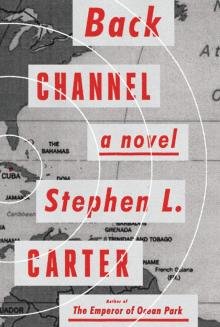 Back Channel
Back Channel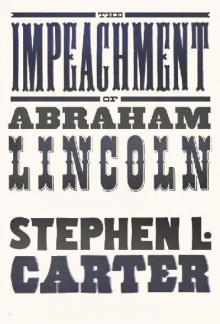 The Impeachment of Abraham Lincoln
The Impeachment of Abraham Lincoln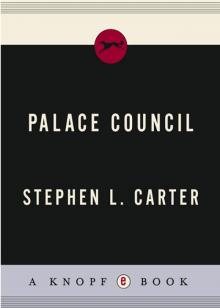 Palace Council
Palace Council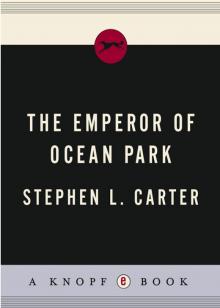 The Emperor of Ocean Park
The Emperor of Ocean Park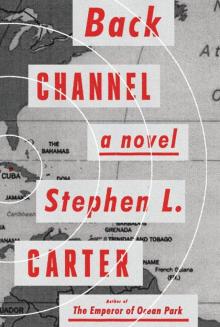 Back Channel: A novel
Back Channel: A novel Emperor of Ocean Park eh-1
Emperor of Ocean Park eh-1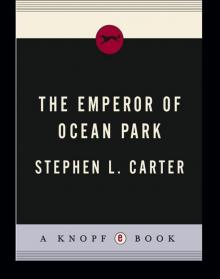 Emperor of Ocean Park
Emperor of Ocean Park